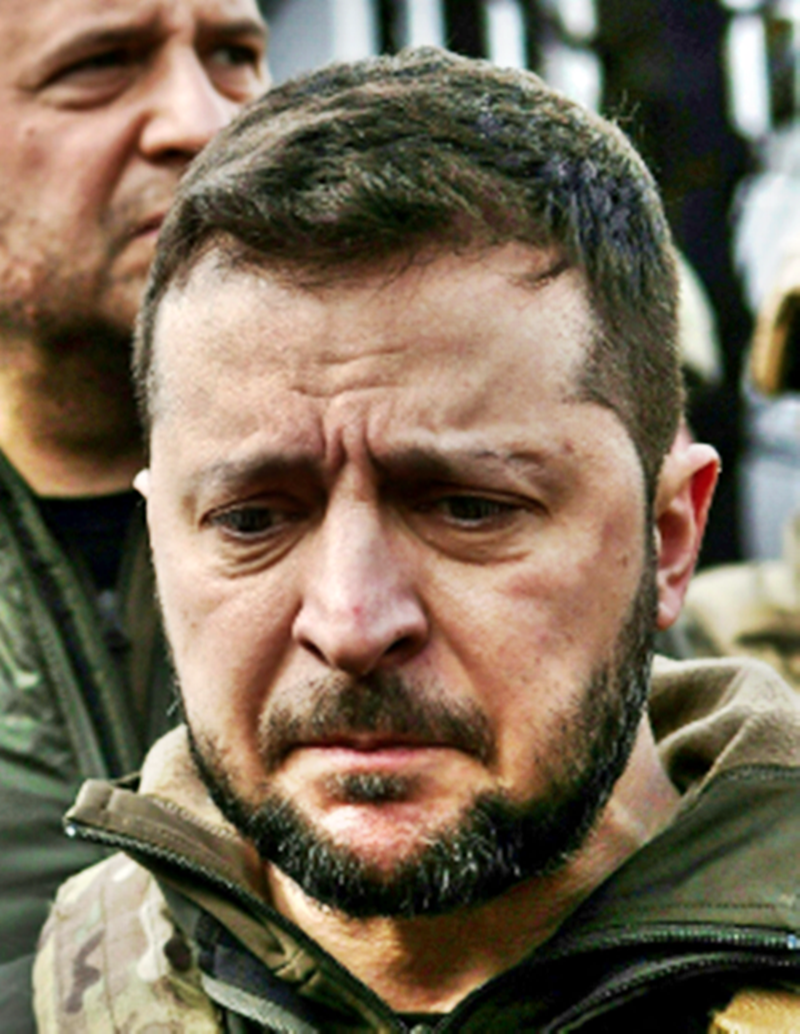Is the West moving to replace Zelensky?

By AsiaTimes - STEPHEN BRYEN - NOVEMBER 11, 2023
There is a growing consensus that the West (meaning the United States with the help of the UK) wants to replace Ukraine’s president, Volodymyr Zelensky. The US has a history of trying to choose Ukraine’s leaders.
My friend and colleague Larry Johnson thinks the CIA and MI6 in the UK are already setting the stage. Either Zelensky will be forced to call a Presidential election, scheduled for next March, and then be replaced, or, if he resists, he will be replaced anyway in a Maidan-style upheaval.
The US has pushed changes in Ukraine’s leadership before, and the current State Department undersecretary, Victoria Nuland, was behind the earlier operation. A 2014 phone call between Nuland and the then-US ambassador to Kyiv, Geoffrey Pyatt, was intercepted and the content of the call was leaked to the press.
The call is interesting because Nuland and Pyatt were selecting an “acceptable” presidential candidate for Ukraine, and they enlisted then-Vice President Joe Biden to help. Note that along with Biden, Jake Sullivan, then and now Biden’s national security advisor, was also enlisted in selecting Ukraine’s next President.
(Republicans in Congress for several years have been investigating Biden’s son Hunter’s activities in Ukraine. They have alleged – so far without finding proof – that Biden himself intervened to protect his son’s business ties there and ties of his own.)
Transcript of intercepted call
Pyatt: I think we’re in play. The Klitschko [Vitaly Klitschko, one of three main opposition leaders] piece is obviously the complicated electron here. Especially the announcement of him as deputy prime minister and you’ve seen some of my notes on the troubles in the marriage right now so we’re trying to get a read really fast on where he is on this stuff. But I think your argument to him, which you’ll need to make, I think that’s the next phone call you want to set up, is exactly the one you made to Yats [Arseniy Yatseniuk, another opposition leader]. And I’m glad you sort of put him on the spot on where he fits in this scenario. And I’m very glad that he said what he said in response.
Nuland: Good. I don’t think Klitsch should go into the government. I don’t think it’s necessary, I don’t think it’s a good idea.
Pyatt: Yeah. I guess…. In terms of him not going into the government, just let him stay out and do his political homework and stuff. I’m just thinking in terms of sort of the process moving ahead we want to keep the moderate democrats together. The problem is going to be [Oleh] Tyahnybok [the other opposition leader] and his guys and I’m sure that’s part of what [President Viktor] Yanukovych is calculating on all this.
Nuland: [Breaks in] I think Yats is the guy who’s got the economic experience, the governing experience. He’s the … what he needs is Klitsch and Tyahnybok on the outside. He needs to be talking to them four times a week, you know. I just think Klitsch going in … he’s going to be at that level working for Yatseniuk, it’s just not going to work.
Pyatt: Yeah, no, I think that’s right. OK. Good. Do you want us to set up a call with him as the next step?
Nuland: My understanding from that call – but you tell me – was that the big three were going into their own meeting and that Yats was going to offer in that context a … three-plus-one conversation or three-plus-two with you. Is that not how you understood it?
Pyatt: No. I think … I mean that’s what he proposed but I think, just knowing the dynamic that’s been with them where Klitschko has been the top dog, he’s going to take a while to show up for whatever meeting they’ve got and he’s probably talking to his guys at this point, so I think you reaching out directly to him helps with the personality management among the three and it gives you also a chance to move fast on all this stuff and put us behind it before they all sit down and he explains why he doesn’t like it.
Nuland: OK, good. I’m happy. Why don’t you reach out to him and see if he wants to talk before or after.
Pyatt: OK, will do. Thanks.
Nuland: OK… one more wrinkle for you Geoff. [A click can be heard.] I can’t remember if I told you this, or if I only told Washington this, that when I talked to Jeff Feltman [United Nations under-secretary-general for political affairs] this morning, he had a new name for the UN guy Robert Serry. Did I write you that this morning?
Pyatt: Yeah, I saw that.
Nuland: OK. He’s now gotten both Serry and [UN Secretary General] Ban Ki-moon to agree that Serry could come in Monday or Tuesday. So that would be great, I think, to help glue this thing and to have the UN help glue it and, you know, fuck the EU.
Pyatt: No, exactly. And I think we’ve got to do something to make it stick together because you can be pretty sure that if it does start to gain altitude, that the Russians will be working behind the scenes to try to torpedo it. And again, the fact that this is out there right now, I’m still trying to figure out in my mind why Yanukovych [garbled] that. In the meantime, there’s a Party of Regions faction meeting going on right now and I’m sure there’s a lively argument going on in that group at this point. But anyway, we could land jelly side up on this one if we move fast. So let me work on Klitschko and if you can just keep … we want to try to get somebody with an international personality to come out here and help to midwife this thing. The other issue is some kind of outreach to Yanukovych, but we probably regroup on that tomorrow as we see how things start to fall into place.
Nuland: So, on that piece, Geoff, when I wrote the note, Sullivan’s come back to me VFR [direct to me], saying you need Biden and I said probably tomorrow for an atta-boy and to get the deets [details] to stick. So, Biden’s willing.
Pyatt: OK. Great. Thanks.
Not an independent country
It is reasonable to say that Ukraine is hardly an independent country. Today the US not only provides military support, but it also pays the salaries of government officials and for Ukraine’s military, including even money for pensions.
The same three American players – Biden, Sullivan, and Nuland – are again deciding about Ukraine. Why would these three be willing to jettison Zelensky?
Washington has let it be known through controlled leaks that its carefully orchestrated plan for Ukraine’s counter-offensive was not followed by Zelensky. Working in opposition to his generals – both Zaluzhny and the more silent Syrskyi – Zelensky decided to renew military operations trying to take back Bakhmut, which had been lost after the Russian Army and Prigozhin’s Wagner forces had driven the Ukrainians out of the city.
The effect of trying to fight Russia on a much wider front meant that the impact of the battle in the south, centered primarily around the so-called Bradley Square area of Zaphorize, was diluted by committing some of Ukraine’s best forces to Bakhmut and other fronts in Donetsk.
But there is even more. Washington’s goal in the offensive was to set the stage for forcing Russia into a deal on Ukraine. By breaking through the so-called Surovikin defense-in-depth, Ukraine’s army would threaten Crimea. (Take note: There are many articles in the US and European press claiming Ukraine was successful in breaking the Surovikin defense line. These stories are pure propaganda.)

Coinciding with the military push south, Ukraine was to hit Sevastopol in Crimea with missiles and unmanned surface vessels laden with explosives, including missile and USV attacks on the Kerch Strait bridge that connects Russia with Crimea. While the Ukrainians managed to cause some damage – they hit the bridge again, damaging it – the bridge was not destroyed.
The counter-offensive run by Washington was mounted after much planning and training. Originally it was to coincide with Prigozhin’s coup d’état in Russia. There is plenty of evidence that Prigozhin was talking to Kyrylo Budanov, head of Ukraine’s military intelligence.
End.
Editor Comments
There is a psychological condition with a ruler demanding his people to fight till the end, then proclaiming himself a ruler of the remaining ashes.
The scenario above reflects elements of a tyrannical leadership style, with a ruler who demands unwavering loyalty and sacrifice from the people. While there might not be a specific psychological condition that precisely matches this description, it does resonate with certain historical and fictional instances of oppressive leadership.
In terms of psychological aspects, such behavior might be associated with traits like narcissism, megalomania, or a severe power complex. Leaders with such traits may exhibit a disregard for the well-being of their citizens and prioritize their desires for control and dominance.
In literature and history, you can find examples of leaders who pursued destructive paths, often leading their nations or followers to ruin. These leaders may have a skewed perception of reality, an inflated sense of self-importance, and a lack of empathy for the suffering of others.
It's worth noting that the described scenario is more characteristic of a narrative or a specific historical event rather than a clinically recognized psychological condition. However, it does touch upon themes explored in the study of political psychology, where researchers examine the psychological factors influencing political behavior and leadership.


